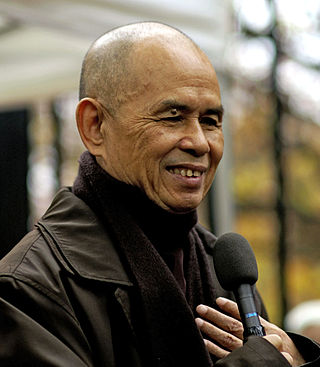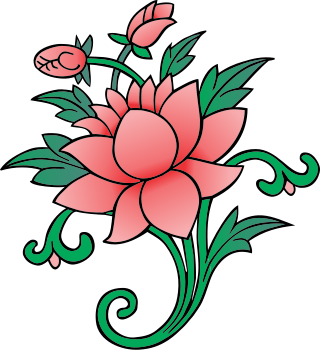
Buddhist cuisine is an Asian cuisine that is followed by monks and many believers from areas historically influenced by Mahayana Buddhism. It is vegetarian or vegan, and it is based on the Dharmic concept of ahimsa (non-violence). Vegetarianism is common in other Dharmic faiths such as Hinduism, Jainism and Sikhism, as well as East Asian religions like Taoism. While monks, nuns and a minority of believers are vegetarian year-round, many believers follow the Buddhist vegetarian diet for celebrations.

Sangha is a Sanskrit word used in many Indian languages, including Pali which means "association", "assembly", "company" or "community"; in these languages, sangha is frequently used as a surname. In a political context, it was historically used to denote a governing assembly in a republic or a kingdom, and for a long time, it has been used by religious associations, including Buddhists, Jains and Sikhs. Given this history, some Buddhists have stated that the tradition of the sangha represents humanity's oldest surviving democratic institution.

Thích Nhất Hạnh was a Vietnamese Thiền Buddhist monk, peace activist, prolific author, poet and teacher, who founded the Plum Village Tradition, historically recognized as the main inspiration for engaged Buddhism. Known as the "father of mindfulness", Nhất Hạnh was a major influence on Western practices of Buddhism.

Chinese Buddhism or Han Buddhism is a Chinese form of Mahayana Buddhism which draws on the Chinese Buddhist canon that includes the andigonous cultural traditions of Confucianism and Taoism and the rituals of local colloquialised folk religions. Chinese Buddhism focuses on studying Mahayana sutras and Mahāyāna treatises and draws its main doctrines from these sources. Some of the most important scriptures in Chinese Buddhism include: Lotus Sutra, Flower Ornament Sutra, Vimalakirtī Sutra, Nirvana Sutra, and Amitābha Sutra. Chinese Buddhism is the largest institutionalized religion in mainland China. Currently, there are an estimated 185 to 250 million Chinese Buddhists in the People's Republic of China. It is also a major religion in Taiwan, Singapore, and Malaysia, as well as among the Chinese Diaspora.

The schools of Buddhism are the various institutional and doctrinal divisions of Buddhism which are the teachings off buddhist texts. The schools of Buddhism have existed from ancient times up to the present. The classification and nature of various doctrinal, philosophical or cultural facets of the schools of Buddhism is vague and has been interpreted in many different ways, often due to the sheer number of different sects, subsects, movements, etc. that have made up or currently make up the whole of Buddhist traditions. The sectarian and conceptual divisions of Buddhist thought are part of the modern framework of Buddhist studies, as well as comparative religion in Asia. Some factors in Buddhism appear to be consistent, such as the afterlife. Which differs on the version of Buddhism.
The Plum VillageMonastery is a Buddhist monastery of the Plum Village Tradition in the Dordogne, southern France near the city of Bordeaux. It was founded by two Vietnamese monastics, Thích Nhất Hạnh and Chân Không, in 1982.

The term American Buddhism can be used to describe all Buddhist groups within the United States, including Asian-American Buddhists born into the faith, who comprise the largest percentage of Buddhists in the country.

Deer Park Monastery is a 400-acre (1.6 km2) Buddhist monastery in Escondido, California. It was founded in July 2000 by Thích Nhất Hạnh along with monastic and lay practitioners from the Plum Village Tradition. The monastery was under the direct guidance of Thích Nhất Hạnh and his Order of Interbeing in the Vietnamese Thiền tradition.
The Order of Interbeing is an international Buddhist community of monks, nuns and laypeople in the Plum Village Tradition founded between 1964 and 1966 by Vietnamese Buddhist monk Thích Nhất Hạnh.

Buddhism is the third largest religion in France, after Christianity and Islam.

Although there was regular contact between practising Buddhists and Europeans in antiquity the former had little direct impact. In the latter half of the 19th century, Buddhism came to the attention of Western intellectuals and during the course of the following century the number of adherents has grown. There are now between 1 and 4 million Buddhists in Europe, the majority in Italy, Germany, Hungary, France and the United Kingdom.

Chân Không is an expatriate Vietnamese Buddhist Bhikkhunī (nun) and peace activist who has worked closely with Thích Nhất Hạnh in starting the Plum Village Tradition and helping conduct spiritual retreats internationally.

Magnolia Grove Monastery is a Buddhist monastery in the Plum Village Tradition in Batesville, Mississippi. The 120-acre (0.49 km2) grounds are located near Memphis, Tennessee. In October 2005 Thích Nhất Hạnh officially accepted the monastery. They are closely in touch with the Plum Village Monastery for resources and support. Magnolia Grove Monastery is one of the three monasteries in the United States which are under the spiritual guidance of Thích Nhất Hạnh. The other two are Blue Cliff Monastery in New York and Deer Park Monastery in California. According to Magnolia Grove Monastery's website, "Magnolia Grove Monastery is a residential monastery and is simultaneously, Magnolia Village, a Mindfulness Practice Meditation Center in the tradition of Plum Village, founded by Zen Master Thich Nhat Hanh".
The Plum Village Community of Engaged Buddhism, Inc. and its sister organization, the French Congregation Bouddhique Zen Village des Pruniers are the governance bodies of the monasteries, press and fundraising organizations established by the Zen Buddhist monk Thich Nhat Hanh. The name Unified Buddhist Church, which originated in Vietnam, was intended to signify that this tradition practices to embrace all the teachings of the Buddha, whether they belong to the Mahāyāna or Theravāda stream.

Buddhism in the United Kingdom is the fifth-largest religious group in the United Kingdom. The 2021 United Kingdom census recorded just under 290,000 Buddhists, or about 0.4% of the total population, with the largest number of Buddhists residing in Greater London and South East England. According to a Buddhist organisation, the growth of Buddhism in the United Kingdom is mainly a result of conversions.

A bhikkhunī or bhikṣuṇī is a Buddhist nun, fully ordained female in Buddhist monasticism. Bhikkhunis live by the Vinaya, a set of either 311 Theravada, 348 Dharmaguptaka, or 364 Mulasarvastivada school rules. Until recently, the lineages of female monastics only remained in Mahayana Buddhism and thus were prevalent in countries such as China, Korea, Taiwan, Japan, and Vietnam, while a few women have taken the full monastic vows in the Theravada and Vajrayana schools. The official lineage of Tibetan Buddhist bhikkhunis recommenced on 23 June 2022 in Bhutan when 144 nuns, most of them Butanese, were fully ordained.

Blue Cliff Monastery is an 80-acre (0.32 km2) Thiền Buddhist monastery located in Pine Bush, New York. It was founded in May 2007 by monastic and lay practitioners from the Plum Village Tradition.

Thiền Buddhism is the Vietnamese version of Zen Buddhism. Thiền is the Sino-Vietnamese pronunciation of the Middle Chinese word 禪 (chán), an abbreviation of 禪那 (chánnà), which is a transliteration of the Sanskrit word dhyāna ("meditation").

The Plum Village Tradition is a school of Buddhism named after the Plum Village Monastery in France, the first monastic practice center founded by Thích Nhất Hạnh. It is an approach to Engaged Buddhism mainly from a Mahayana perspective, that draws elements from Zen and Theravada. Its governing body is the Plum Village Community of Engaged Buddhism.















